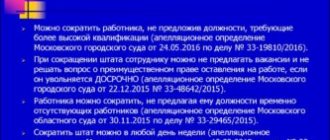Meaning of Art. 33 Labor Code
In the Labor Code of the Russian Federation (LLC), approved by the Supreme Court of the RSFSR on December 9, 1971 (or the old Labor Code), art. 33 played an important role because it contained a list of grounds giving the organization’s administration the right to initiate, on its own initiative, the termination of an employment contract with an employee. Most often, dismissal under Article 33 of the Labor Code meant that the employee was fired due to absenteeism or systematic disciplinary violations. This, accordingly, had a negative semantic connotation for him and subsequently served as an obstacle to normal employment.
Although the list of grounds contained in Article 33 of the old Labor Code of the Russian Federation was in fact broader and did not always imply the presence of a violation of discipline. For example, this also included layoffs due to the liquidation of an organization or due to a reduction in the number of employees.
https://youtu.be/TH6HY0EpsqM
Nuances of dismissal of pensioners
We are talking about those people who, upon reaching retirement age, continue to work at their native enterprise. Despite the fact that working pensioners are equal in all respects to other employees, by law they have the right to dismissal at their own request, including in 2020, the very next day after writing an application.
It happens that the manager demands continuation of work for two weeks, but such actions can be protested. An exception is if a person became a pensioner at a different enterprise from which he plans to leave, but got a job already at retirement age, and in his work book there is an entry: “dismissed due to retirement.” Then, when dismissing at a personal request, he is obliged to follow the generally accepted procedure. And if he stops working immediately after submitting his application, he will be fired for absenteeism.
How long does it take for a director to resign?
The manager also has the right to dismiss at his own request. The meeting of founders dismisses (as well as appoints) the director. The director must notify this body of his decision at least a month in advance, because he is the employer for the remaining employees, and it is necessary to elect a new director. The general meeting of founders meets one month after the notification. It considers the issue of dismissal, and then goes through the procedure for terminating the contract, issuing the required payments, and issuing a work book. By agreement with the person resigning, any date for termination of the contract is set (the work has already been completed).
Chief Accountant
Upon dismissal, he will have to hand over accounting documents according to the act, take part in the inventory, and submit submitted reports for verification. This will not take more than the two weeks allotted for working out.
Trainee
An employee on a probationary period may resign earlier than the agreed period by notifying management at least three days before leaving. Otherwise, the procedure is similar to the dismissal of ordinary workers. The same applies to employees who signed a contract for a period of no more than two months.
Labor legislation: changes in 2002
On February 1, 2002, the Labor Code was replaced by a new law - the Labor Code of the Russian Federation (LC RF). The need for its adoption was caused by significant changes in both the socio-political life of Russia and economic relations. In the field of labor law, changes were required mainly:
- due to the growing role of market relations in the country;
- the emergence of employers with different forms of ownership than those under which the Labor Code was created.
The new law was supposed to formulate in a new way the principles of the relationship between employer and employee, transferring their relationship into a contractual one and maximally protecting the interests of each of them.
While maintaining the continuity of many provisions of the old law (about 50%), the new Labor Code of the Russian Federation at the same time became much more detailed, in some places acquired a different content and was divided into chapters and articles in a different way. The number of the latter, in particular, has increased significantly. As a result, their numbering has changed, and Article 33 of the Labor Code of the Russian Federation no longer considers dismissal issues.
Meanwhile, workers who have not delved into the intricacies of changes in labor legislation retain the memory of dismissal under this article, so you can often hear a reference to it in conversation, implying dismissal for a disciplinary offense. Moreover, some have a note about it in their work book. Taking into account the fact that in reality a different law has long been in force, in which there is an analogue of Art. 33 of the Labor Code under a different number and with significantly changed content, it is more correct to apply a different link to the grounds for dismissal at the initiative of the employer.
If you change your mind about changing jobs
On any of the days of the two-week period following the submission of a resignation letter of your own free will, you can pick up the document and continue working in your previous place, as if nothing had happened. You just need to write a new application - about the revocation of the previous one, do not forget to put the date and sign.
You can also make a note that you have changed your mind about quitting on your initial application. Remember to have two copies! The main thing is that the expression of will be expressed in writing and not verbally.
If over the past days (which are intended to select a person for the upcoming vacancy) no one has yet been officially invited to replace the person who submitted the resignation letter, a return “to normal” is possible. But if a “substitute” is found, the employer has the right to refuse the person who changes his mind.
Contents of Art. 33 in the Labor Code of the Russian Federation
Article 33 of the Labor Code of the Russian Federation in its new version moved from the section devoted to the consideration of the intricacies of the employment contract to the section devoted to issues of social partnership in the sphere of labor, and became known as “Employer Representatives”. Already from its name it is absolutely clear that regarding issues of dismissal Art. 33 of the Labor Code of the Russian Federation has nothing to do with it.
In its latest version, Art. 33 of the Labor Code of the Russian Federation consists of two parts dedicated to employer representatives in interaction:
- With own employees (their collective) when negotiating or developing (amending) a collective agreement. Here, the employer can be represented by the head of the legal entity, personally by the employer-individual entrepreneur, or by persons authorized by them for such representation. And for employers established by a state, regional or municipal body, such a representative will be the corresponding government body (Article 34 of the Labor Code of the Russian Federation).
- With groups of workers on issues (or disputes) of a collective nature related to the conclusion (change) of labor agreements, as well as when participating in the work of commissions regulating social and labor relations. Here, the interests of employers are represented by their association, formed at the appropriate level (from territorial to all-Russian). The creation of industry and inter-industry associations is also permitted.
The existence of employers' rights to association is confirmed by:
- Art. 2 of the Law of the Russian Federation “On Associations of Employers” dated November 27, 2002 No. 156-FZ;
- clause 2 art. 7 of the Law of the Russian Federation “On the Russian Tripartite Commission for the Regulation of Social and Labor Relations” dated May 1, 1999 No. 92-FZ.
Vacation first
By virtue of the penultimate paragraph of Art. According to the law, in most cases, an employer does not have the right to dismiss an employee while he is on vacation.
However, nothing prevents a worker from resigning on his own initiative. In this case, the employee, in accordance with paragraph. 2 tbsp. 127 of the Law, has the right to write a statement with a request to dismiss him after the end of his vacation. In this case, the last. the day of work will be considered the last. vacation day.
Analogue of Art. 33 Labor Code in the Labor Code of the Russian Federation
Contents similar to Art. 33 of the Labor Code, in the new law acquired Art. 81 of the Labor Code of the Russian Federation, which reflected a clarified and expanded (in comparison with the Labor Code) list of grounds for dismissal related to the employer’s initiative.
Changes in content were reflected not only in a significant increase in the number of reasons for dismissal (13 versus the previous 8), but also in the expansion of the text of explanations for them. At the same time, 2 main provisions present in Art. 33 of the Labor Code, transferred to Art. 81 Labor Code of the Russian Federation:
- In some situations, the employer is required to try to employ the employee before dismissing him;
- Dismissal caused by the initiative of the employer is prohibited while the employee is on sick leave or on vacation.
To learn about possible combinations of dismissal and illness situations, read the article “Is it possible to quit while on sick leave?”
General requirements for dismissal articles of the Labor Code
With changes in the Labor Code of the Russian Federation, there is a tendency to increase the protection of employers from unscrupulous workers. Thus, in 1918, an employer could dismiss an employee for one of 4 reasons; in 1922, there were already 7 such reasons; in 1971, there were 14 dismissal clauses at the initiative of the employer; and in today’s edition of the Labor Code there are already 18 of them.
The main feature of the list of reasons for dismissing an employee from his position is his finiteness. This means that the dismissal order, as well as the employment contract, cannot contain a reason or article of dismissal other than one contained in the Labor Code. Even if the dismissal occurs by mutual consent.
EXCEPTIONS : special grounds for dismissal are provided for certain positions:
- management level (clause 3 of article 278 of the Labor Code of the Russian Federation);
- personnel working for individual entrepreneurs (Article 307 of the Labor Code of the Russian Federation);
- hired workers performing home work (Article 312 of the Labor Code of the Russian Federation);
- employees of religious organizations (Article 347 of the Labor Code of the Russian Federation).
List of reasons for dismissal under Art. 33 Labor Code
Art. 33 of the Labor Code, the dismissal of an employee at the initiative of the employer was associated with:
- with the liquidation of the organization or reduction of its staff (clause 1);
- inadequacy for the position held due to the level of qualifications or health status (clause 2);
- systematic disciplinary violations, expressed in failure to perform labor functions or labor regulations (clause 3);
- absenteeism, which equated to absence from work for more than 3 hours per working day (clause 4);
- an illness lasting more than 4 months in a row, unless it is maternity leave or an injury (illness) resulting from production-related factors (clause 5);
- reinstatement of an employee who previously held the position of the current employee (clause 6);
- showing up at work in a state of intoxication of any kind (clause 7);
- committing theft, the fact of which was confirmed by a decision of the court or other body that brought the employee to punishment (clause 8).
The clause about the need for an attempt at employment at the same place of work prior to dismissal related to reasons related to:
- with clause 1 - liquidation (staff reduction);
- clause 2 - inconsistency with the position;
- clause 6 - reinstatement of a previously dismissed employee.
Labor Code of the Russian Federation 31 articles
According to the rules of the Russian language, the last day of work is June 29, 2000, since the employee was fired from June 30, 2000. At the same time, when an employee is dismissed, column 2 of the work book indicates the date of dismissal (last day of work). Therefore, the last day of work (date of dismissal) should be considered June 30, 2000.
To clarify the date of dismissal, we allow you to request from the previous employer (if available) a dismissal order, which is indicated in the work book, on the basis of which an entry was made in the work book ( one type of printed matter: a non-periodical publication consisting of bound or separate paper sheets (pages) or notebooks on which it is printed or handwritten
).
Legal basis:
According to Part 3 of Art. 84.1 of the Labor Code of the Russian Federation, the day of termination of an employment contract in all variants is the last day of work ( can mean: Work - the functioning of any system - a mechanism, biocenosis, organism or community - as well as its part
) employee, with the exception of options when the employee practically did not work, but in accordance with the Labor Code of the Russian Federation or other federal law, his place of work (position) was retained.
In accordance with clause 5.1 Annotations on filling out work books (approved by Resolution of the Ministry of Labor of the Russian Federation of October 10, 2003 N 69), an entry about dismissal (termination of an employment contract) in the employee’s work book is made in the following order: in column 1 the serial number of the entry is entered; column 2 indicates the date of dismissal (termination of the employment contract); in column 3, an entry is made about the reason for dismissal (termination of the employment contract); Column 4 indicates the name of the document on the basis of which the entry was made - an order (instruction) or other decision of the employer, its date ( date - the serial number of the calendar day, the serial number or name of the calendar month and the serial number of the calendar year (Federal Law of the Russian Federation dated June 3, 2011 no.
) and number.
The date of dismissal (termination of an employment contract) is considered the last day of work, unless otherwise established by federal law, an employment contract or an agreement between the employer and employee.
For example, when an employment contract with an employee is terminated due to a reduction in staff, October 10, 2003 is found to be the last day of his work. The following entry must be made in the employee’s work book: in column 1 of the “Information about work” section, the serial number of the entry is entered, in column 2 the date of dismissal is indicated (10.10.2003), in column 3 the entry is made: “Dismissed due to a reduction in the number of employees of the organization, paragraph 2 of Article 81 of the Labor Code of the Russian Federation,” column 4 indicates the date and number of the order (instruction) or other decision of the employer on dismissal.
Rostrud information portal “Onlineinspection.RF”, December 2016
Employees have the right to terminate the employment contract (agreement) concluded
for an indefinite period, having notified the administration about this in writing two days in advance
weeks.
In cases where an employee’s statement of resignation of his own free will
justified by the impossibility of continuing his work (enrollment in an educational institution,
transition to retirement and other options), the administration terminates the employment contract
(contract) within the period requested by the employee. (as amended by the Law of the Russian Federation
dated September 25, 1992 N 3543-1 - Gazette of the Congress of People's Deputies of the Russian
Federation (
a form of government in which parts of the state are state entities with legally defined political independence within the federation) and the Supreme Council of the Russian Federation, 1992, No. 41, Art. 2254).
Upon expiration of the notice period for dismissal, the employee has the right to terminate
work, and the administration of the company, institution, organization must issue
employee's work book and make payments to him.
By agreement between the employee and the administration, an employment contract
(contract (
an agreement between two or more parties on any issue) may be terminated before the expiration of the notice period for dismissal
(as amended by the Decree of the Presidium of the Supreme Soviet of the RSFSR dated February 5, 1988 - Vedomosti
Supreme Council of the RSFSR, 1988, N 6 art. 168); (as amended by the Law of the Russian Federation
dated September 25, 1992 N 3543-1 - Gazette of the Congress of People's Deputies of the Russian
Federation and the Supreme Council of the Russian Federation, 1992, N 41, art. 2254).
Commentary on Article 31 of the Labor Code of the Russian Federation
§1. For employees who have entered into a fixed-term contract, Art. 31 Labor Code does not apply
since they for the duration of the contract prohibited themselves from resigning on their own
desire. But when they have valid reasons for dismissal, then it applies
Art. 32 of the Labor Code (see Art. 32 of the Labor Code and commentary thereto). Other employees at any time
time they can submit a letter of resignation at their own request ( or lust - an average degree of will, between simple organic desire, on the one hand, and a deliberate decision or choice, on the other
).
Persons sentenced to correctional labor without imprisonment during the term
their service cannot be dismissed at will without permission
this is the responsibility of the authorities in charge of carrying out this type of punishment (see Article 94 of the ITC
RF).
§2. Only the clearly expressed desire of the employee who has entered into an employment contract
for an indefinite period, is the basis for his dismissal on his own
desire. At the same time, Art. 31 of the Labor Code provides for two notice periods. Submitted
the employee’s application may not contain instructions for a specific period and motives
dismissals. Then a two-week period applies from the date of submission of the application.
An employee can also submit an application during vacation or a business trip.
If in the application the employee shows valid reasons for dismissal,
due to which he cannot continue to work and immediately submits the appropriate
confirmation, then the employment contract is terminated within the period requested
worker. When this period passed and the administration did not formalize his dismissal
and he continues to work, then the administration cannot fire him after
2 weeks after submitting the application, if the employee does not agree to this. Resolution
Plenum of the Supreme Tribunal of the Russian Federation dated December 22, 1992 N 16 emphasizes that if
upon expiration of the notice period, the employment contract (agreement) was not terminated
and an employee ( or Employee - a subject of labor law, an individual working under an employment contract with an employer and receiving wages for this
) does not insist on dismissal, the validity of the employment contract is considered
continued.
If a child under 18 years of age filed an application for his dismissal, then about this
You need to inform the juvenile affairs commission.
§3. Since according to part 4 of Art. 31 Labor Code by agreement between employees
and the administration, the employment contract (agreement) can be terminated before the expiration
notice period for dismissal, then the dismissal of the employee by agreement
may be immediate.
§4. An employee who has submitted a notice of resignation has the right to
warnings to withdraw your application, and dismissal is then not made,
not counting the 1st option, when another creature has already been invited to take his place
an employee who, in accordance with Part IV of Art. 18 Labor Code cannot refuse admission to
work.
§5. If the employee quits work before the expiration of the notice period and
without an order to dismiss him prematurely, then the administration can qualify
this is like absenteeism without valid circumstances and dismiss him for absenteeism (see paragraph 4 of Art.
33 Labor Code and commentary thereto).
The administration does not have the right to dismiss the employee without the consent of the employee on the basis of
their application before the expiration of the warning period. She can't fire him
Art. 31 of the Labor Code, if there is no written statement from the employee about this.
§6. After the warning period expires, if the administration does not fire him
for some reason (which often occurs in practice), an employee may quit
work, and administration ( Administration in politics is a set of bodies performing management functions in the state or its part (executive and administrative bodies), as well as the activities of such bodies in
) must give him a work book and carry out
him calculation. If she delays this, then according to Art. 99 Labor Code for employees
average earnings are paid for the entire period of forced absence, since
he cannot apply for another job without a work book.
§7.
General points of the old art. 33 Labor Code and new art. 81 Labor Code of the Russian Federation
In the new art. 81 of the Labor Code of the Russian Federation preserves the reasons for dismissal caused by:
- Liquidation (termination of activities) of the employer or reduction of its staff. At the same time, these reasons were broken down into two independent points.
- Inadequacy for the position due to insufficient qualifications. There was a requirement for confirmation of non-compliance with qualifications by the certification commission. The reason related to health status has been removed from the paragraph.
- Systematic misconduct of a disciplinary nature.
For more information about disciplinary violations, including those committed systematically, read the material “Disciplinary liability of an employee and its types.”
- Absenteeism, which is equivalent to absence from work for more than 4 hours in a row. This paragraph not only increases the length of time of absence, but also details the definition of absenteeism and clarifies the place in relation to which absence from work can be discussed.
- Appearing at work in a state of intoxication of any kind.
- Committing theft, the fact of which is confirmed by a decision of the court or other body that brought the employee to punishment. This reason is supplemented by such grounds as intentional damage to property, expressed in its waste or intentional damage (destruction).
Accordingly, the requirement for the employer to attempt to employ employees before layoffs caused by a reduction in the number or insufficient qualifications of employees remains in force.
When can you quit without working?
The Labor Code of the Russian Federation provides for a number of situations in which the employer is obliged to dismiss an employee without working off (Article 80 of the Labor Code of the Russian Federation). We are primarily talking about situations when an employee cannot continue working:
- retirement;
- enrollment in a university or educational institution;
- moving to another locality;
- spouse moving abroad for work;
- appointment to an elected position;
- caring for a sick family member;
- medical restriction on working on the employer's premises.
You can also quit without working:
- if there is a conflict situation with a clear violation of the law on the part of the employer;
- when management exceeds official authority in relation to an employee;
- in case of failure to comply with the deadlines for payment of remuneration (wages, bonuses, vacation pay, sick leave);
- in the absence of proper equipment in the workplace, which interferes with the performance of official duties.
But all of the above reasons need to be proven. This is often very difficult to do, especially in conflict situations.
Innovations Art. 81 of the Labor Code of the Russian Federation in comparison with Art. 33 Labor Code
Not preserved in Art. 81 of the Labor Code of the Russian Federation, the grounds present in Art. 33 of the Labor Code, in the new law were moved to other articles:
- inadequacy for the position due to health conditions was transformed into the basis specified in paragraph 8 of Art. 77 of the Labor Code of the Russian Federation (impossibility of selecting a job that corresponds to the state of health, or the employee’s refusal to do such work);
- a long-term illness can now, depending on the situation, lead to dismissal either under clause 8 of Art. 77 of the Labor Code of the Russian Federation (impossibility of selecting a job that corresponds to the state of health, or the employee’s refusal to do such work), or under clause 5 of Art. 83 Labor Code of the Russian Federation (complete inability to work);
- the reinstatement of an employee who previously worked in the place of the current employee has moved to the list of grounds independent of the will of the parties (Clause 2 of Article 83 of the Labor Code of the Russian Federation).
The new grounds that appeared in Art. 81 Labor Code of the Russian Federation, steel:
- Change of owner of a legal entity (clause 4) as a basis for dismissal of the head of this legal entity, his deputies and the chief accountant.
- A one-time gross disciplinary offense (clause 6), the list of which included absenteeism, showing up at work in a state of intoxication of any kind, and committing theft (embezzlement, deliberate damage or destruction of property). In addition, the following reasons were included here: disclosure of any of the secrets that turned out to be known to the employee;
- violation of labor protection requirements, leading to serious consequences or creating a threat of them.
- a decision made by the owner in relation to the head of the legal entity (clause 2 of Article 278);
Some of these grounds (clauses 7, 8, 10, 13 of Article 81 of the Labor Code of the Russian Federation) were previously present in Art. 254 of the Labor Code and were described as arising under certain conditions.
Available in Art. 33 of the Labor Code clarifications on an attempt at employment prior to dismissal in some cases, as well as on the prohibition of dismissal during illness and vacation in Art. 81 of the Labor Code of the Russian Federation is supplemented with conditions on the need:
- conducting certification of employees in accordance with labor legislation;
- making every effort to employ an employee before his dismissal, including offers of a lower position and work in another area;
- compliance during the liquidation of a branch with the rules applied during the liquidation of a legal entity;
- non-application of dismissal later than 1 year from the moment of discovery of such offenses as loss of trust in connection with guilty actions in relation to property (clause 7 of article 81 of the Labor Code of the Russian Federation) and an immoral act of a teacher (clause 8 of article 81 of the Labor Code of the Russian Federation), if they committed not at work or not in connection with work functions.
Sample of how to write a letter of resignation without working for two weeks
When deciding to change jobs, you must comply with the legal requirements.
And it doesn't matter what the reason was. It may have been a very busy week, or for some, a whole year.
The decision was made by the employee, which means that the employer must be notified a couple of weeks before the planned date of departure. When it is impossible to meet the deadlines, it is worth turning to the Labor Code and seeing if amendments may have been made and you will be able to leave.
Turning to the Labor Code, we will see that quitting is not difficult, just look at Art. 80 Labor Code of the Russian Federation.
Thanks to the amendments and clarifications to the article, we see who can unconditionally exercise this right:
- Pensioners (exempt from service);
- Persons called up for service by the commissariat;
- Students enrolled in training (confirmation of enrollment is provided).
According to the amendments, employees who are on a probationary period or who are on a fixed-term contract for up to 2 calendar months must write a resignation letter 3 days in advance.
Article 77 of the Labor Code of the Russian Federation applies. Part 1. clause 3. Please note that when filling out your work book by the HR department, the corresponding article will be indicated
Dismissal without work for caring for a child under 14 years of age
The process of writing an application is similar to the standard one, but as a reason, it is necessary to indicate the care of a child under fourteen years of age. In this case, the initiative comes from the employee. This must be reported to the HR department 2 weeks in advance.
What documents are needed for dismissal without service?
To terminate the employment relationship, it is necessary to provide supporting documents indicating the inability to continue working. For example, in the case of enrollment in training, a certificate from the educational application is provided, and in case of conscription for military service - from the commissariat.
2 weeks work upon dismissal
The employee must be notified of dismissal on personal initiative in advance; he will have 14 working days or calendar days ahead of him upon dismissal. This is provided for by the terms of the agreement and the Labor Code of the Russian Federation.
Therefore, every person who decides to change jobs must comply with these deadlines. In cases where a citizen holds a leadership position (director) or coach, the period increases to 30 days. You can withdraw your application during this period if a new employee is not hired.
Rules for filing an application for dismissal without service:
- Company name;
- Official, surname and initials;
- Last name and initials of the employee.
The following is the text of the statement. Don't forget to indicate the reason. When drawing up an application on your own initiative to terminate an employment contract, check with the HR department about the amendments that have entered into force that are relevant specifically for you.
Dismissal at will without work - new amendments to the Labor Code of the Russian Federation 2017
There are grounds that are not prescribed at the legislative level, but which are taken into account when making a decision:
- Caring for a seriously ill relative (child);
- Change of residence by spouse;
- Disability
- Caring for a disabled minor (according to amendments to the Labor Code of the Russian Federation)
Companies prefer not to enter into legal disputes with employees. To terminate the contract early, it is enough to indicate the points above. Not many employers are able to track the amendments that are made annually to the Labor Code. Articles are subject to constant correction.
How to calculate dismissal with 2 weeks of work?
This article can be applied except in cases where the employee is guilty of any actions. Sick leave/vacation days are counted towards this period. At the end of sick leave, you must provide a certificate. If an employee decides to continue working for the company, it is necessary to inform about this before the start of the vacation.
Explanations from Rostrud regarding the dismissal of a pensioner without working for two weeks
Citizens who have reached retirement age are not required to leave their place of work or terminate their employment relationship. They have the right to continue working after reaching the legal age. When writing an application, the reason indicated is reaching retirement age.
Shift of emphasis in Art. 81 of the Labor Code of the Russian Federation in relation to Art. 33 Labor Code
The reasons for dismissal contained in Art. 33 of the Labor Code, as well as the grounds given in Art. 81 of the Labor Code of the Russian Federation, are divided into 3 groups:
- occurring due to changes in the employer's organizational structure;
- related to the employee’s guilt;
- others.
From Art. 33 of the Labor Code, accordingly, they include:
- liquidation of the employer, reduction of staff;
- disciplinary violations: systematic, absenteeism, intoxication, theft;
- inadequacy for the position held, long-term illness, reinstatement of a previously employed employee.
In Art. 81 of the Labor Code of the Russian Federation these groups include:
- liquidation of the employer, reduction of staff, change of owner;
- systematic and one-time gross violations of labor discipline, loss of trust, immoral act, guilt of the manager, concealment or distortion of information about oneself;
- inconsistency with the position held, additional grounds for the manager, other cases.
Thus, if we do not take into account those grounds that actually do not depend on the will of either the employee or the employer (long-term illness, reinstatement of a previously employed employee), then the grounds for dismissal on the initiative of the employer turned out to be supplemented by a number of reasons of a disciplinary nature (including including those that were previously completely absent from labor legislation) and motives determined by the decisions of the owner (including those that differ depending on the form of ownership).
Completing the application correctly
There is no normatively approved form for a resignation letter; it is written by hand, or, as an option, typed on a computer (but the signature must be personal), and includes two to three dozen words.
The application shall indicate:
- name of the organization, surname, initials of the head;
- request to dismiss (terminate the contract) at your own request in accordance with Art. 80 Labor Code of the Russian Federation;
- in the case under consideration - clarification: “without processing”, reason and list of supporting documents;
- the day of the last return to duty (it will also be the day of dismissal if the application is signed);
- date when the application is written;
- personal signature of the applicant (without a signature, an application is not a document and will not be taken into account).
You can use a standard application form - there is less risk of making mistakes. Write competently, clearly, legibly.
The application is submitted personally to the manager or the human resources department, or sent by registered mail with notification. This is lawful and cannot be held against the applicant in controversial cases.
It is recommended to make two copies or make a copy for yourself, where to make a registration mark in case of unforeseen (or perhaps expected) circumstances.
Results
Art. 33 of the current Labor Code of the Russian Federation in its content has nothing to do with the issue of dismissal, but is associated with the article of the already canceled Labor Code, which has the same number, which directly related to the issue of dismissal at the initiative of the employer. In the current Labor Code of the Russian Federation, an analogue of Art. 33 of the Labor Code is Art. 81, significantly expanded in comparison with its predecessor.
Sources:
- Labor Code of the Russian Federation
- Federal Law of November 27, 2002 N 156-FZ
- Federal Law of 01.05.1999 N 92-FZ
You can find more complete information on the topic in ConsultantPlus. Full and free access to the system for 2 days.
Calculation upon dismissal of one's own free will according to the Labor Code
Art. 140 Labor Code of the Russian Federation and Art. 98 of the Labor Code contain almost identical provisions regarding the timing of payment - it must be made on the day of dismissal.
If the worker was not at work on the day of dismissal, the payment is made no later than the next working day after the relevant request is submitted.
If there is a dispute about the amount due, the employer is obligated to pay the amount that is not in dispute.
Also, the current Labor Code of the Russian Federation provides for the right of employers to pay severance pay in cases other than those specified in the Labor Code of the Russian Federation (even when dismissing on their own - the last paragraph of Article 178 of the Labor Code of the Russian Federation). The Labor Code contained only clearly regulated cases (Article 36, Article 40.3 of the Labor Code).
Is work required?
As mentioned above, a feature of dismissal on the initiative of the worker may be leaving without working off. And it is not mandatory when there are compelling reasons approved by Article 77 of the Labor Code of the Russian Federation.
It must be remembered that in order for neither you nor your boss to accuse each other of non-compliance with rules and laws, all reasons for a worker leaving a given job that do not require working out the required period after submitting an application for resignation must be documented.
As in the case of an illness for which an employee cannot continue to work, a medical certificate is required.
Or in case of an urgent move, you must provide a certificate of deregistration.
Documentation
The only document the employee needs to provide is an application.
The employer is required to give the employee the following documentation after leaving work:
- work book with an entry about the termination of the contract, with reference to the article of the Law;
- certificate 2-NDFL confirming wages and accrued personal income tax;
- other papers related to work in one way or another.










